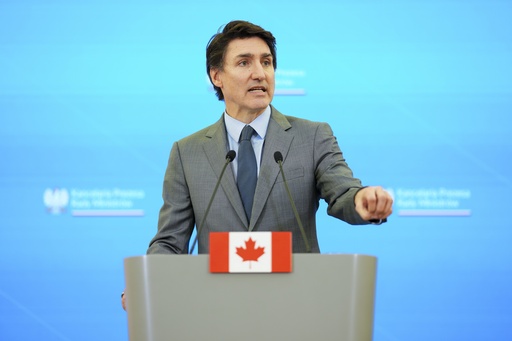
PALM BEACH, Fla. — President Donald Trump is set to impose new trade penalties targeting Canada, Mexico, and China, commencing Saturday. These tariffs reflect an assertive strategy towards the United States’ three primary trade partners, potentially leading to increased inflation and disruptions in the global market.
The tariffs include a 25% levy on imports from Canada and Mexico, along with a 10% tax on imports from China, the latter of which is viewed as a principal economic competitor. Trump sees these measures as a means to leverage U.S. financial power and influence global economic dynamics. “You see the power of the tariff,” he stated to reporters, emphasizing that the U.S. possesses the largest financial resources globally.
This decision represents a substantial political gamble for Trump, as he hopes these tariffs will not escalate inflation or trigger financial instability at a global level, nor provoke a negative response from voters. According to a recent comprehensive survey, American public opinion remains divided on the issue of tariffs.
There is a potential for these tariffs to be temporary if Trump can negotiate satisfactory terms regarding illegal immigration and fentanyl trafficking with Canada and Mexico. Additionally, the impetus for the tariffs against China is also linked to concerns over fentanyl.
Trump’s decision aligns with promises made during his 2024 presidential campaign, which are integral to his economic and national security philosophy. Although some of his allies have downplayed the potential impact of increased tariffs, suggesting they are merely part of negotiation tactics, the president appears to be implementing more import taxes as part of his broader economic strategy. He indicated that future tariffs could target a wide array of goods, including computer chips, steel, oil, and pharmaceuticals—actions that may set the U.S. against much of the international economy.
The reaction from financial markets was immediate, with the S&P 500 stock index showing a decline following Trump’s announcement. The long-term implications for business investments that Trump assured would increase alongside cuts to corporate tax rates and deregulation remain uncertain. Typically, the introduction of tariffs results in elevated prices for both consumers and businesses due to the increased cost of foreign goods.
In the recent election, many voters supported Trump with the expectation that he could manage the inflation issues that surged under Democratic President Joe Biden. However, inflation expectations are rising, as evidenced by a recent index indicating that consumers anticipate prices to rise by 3.3%, outpacing the current reported annual inflation rate of 2.9%.
Trump has advocated for generating more government revenue through tariffs, harkening back to a time before the introduction of income tax in the U.S. He argues, contrary to widespread economic views, that the nation’s wealth peaked in the 1890s under President William McKinley, a period he romanticizes as a “tariff country.”
As he continues to pursue policies resembling McKinley’s, Trump is conducting what some economists perceive as a real-time test of the theory that higher tariffs do not automatically lead to increased prices. Despite the lack of significant inflationary effects from his first-term tariffs, broader implementation could change the economic landscape significantly.
Analysts have pointed out that these latest tariffs, if sustained, would represent a dramatic policy shift and could have profound effects on the U.S. and its trading partners. The lack of exemptions could translate to higher prices for everyday consumer products, such as iPhones, raising questions about the influence of corporate America during Trump’s administration.
Research conducted by economists indicates that the tariffs could impede growth for all affected countries, particularly Canada and Mexico due to their economic dependence on the U.S. The Canadian Prime Minister has warned citizens of challenging times ahead, asserting that Canada is poised to respond with its own retaliatory measures if necessary, highlighting the potential for self-inflicted damage from U.S. penalties.
The Mexican President also expressed readiness to respond, emphasizing that her country has been proactive in addressing issues related to border security and trafficking. She mentioned that Mexico has contingency plans prepared in response to the U.S. decisions.
Trump’s ability to implement these tariffs effectively hinges on gaining congressional support for his budget, tax cuts, and an increase in the government’s borrowing capacity. The ramifications of his tariff strategy could either consolidate his power or diminish it.
Democratic lawmakers are actively working on legislation designed to limit Trump’s capacity to impose tariffs without legislative approval, though passing such measures in a Republican-controlled Congress appears unlikely. “If this weekend’s tariffs go into effect, they’ll do catastrophic damage to our relationships with our allies and raise costs for working families by hundreds of dollars a year,” warned one senator, emphasizing the potential consequences of these trade actions.

